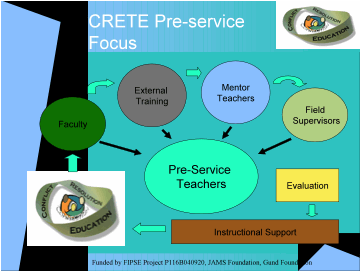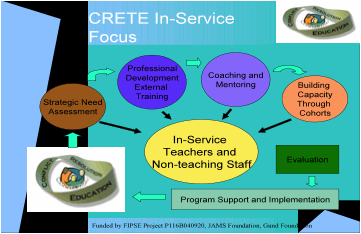About the CRETE Project
Conflict Resolution Education in
Teacher Education
Grab a word version or pdf version of this description, updated April, 2010. See also this video on the collaboration with the JAMS Foundation to expand CRETE.
“No Teacher Left Behind”
- 50% of teachers nationwide leave teaching after 3 years due to chaotic and disruptive learning environments and difficulty managing conflict.
- Conflict resolution education (CRE) helps teachers improve their classroom management and increases their willingness to stay in the teaching profession.
- Teachers who know CRE can teach these valuable skills to students and help create a physically and emotionally safe learning environment.
- CRE has proven benefits in terms of increasing students’ academic achievement, constructive conflict behavior, and decreasing aggression and discipline problems.
CRETE educates teachers in conflict resolution education and social and emotional learning to help teachers constructively manage conflict, create positive learning environments, and develop students’ conflict competence and social skills. CRETE partners with colleges of education to infuse CRE and SEL in teacher education curriculum and professional development programs.
CRETE is funded by the United States Department of Education FIPSE Program (P116B040920 and P116B070143), the JAMS Foundation, the George Gund Foundation, and the William and Flora Hewlett Foundation.
Higher Education Institution CRETE Partners:
- California
- California State University – Fresno
- San Francisco State University
- District of Columbia
- Trinity Washington University
- Georgia
- Kennesaw State University
- Illinois
- DePaul University
- Roosevelt University
- Maryland
- Goucher College
- North Baltimore Center affiliated with Sheppard Pratt Institute
- University of Maryland – Baltimore County
- New Hampshire
- Nashua Community College
- New York
- Hunter College, CUNY
- Metropolitan College of New York
- Pennsylvania
- Lincoln University
- Temple University
- Ohio
- Antioch University (inactive)
- Cleveland State University
- Cuyahoga Community College
- University of Akron
- Wilmington College
- Texas
- Abilene Christian University
- Alamo Community College District
- Northwest Vista Community College
- Palo Alto Community College
- Our Lady of the Lake College
- St. Mary’s University
- University of the Incarnate Word
HEI CRETE Partners in Development:
- California
- California State University – Northridge
- University of Southern California
- New Jersey
- The College of New Jersey
- Pennsylvania
- Cheyney University
- Ohio
- Hocking Community College
- Ohio University
- Texas
- Concordia University
- St. Edward’s University
- University of Texas – Dallas
- Virginia
- George Mason University
Why is CRETE Important?
Teaching conflict education to pre-service and in-service teachers addresses urban education’s dual crises of teacher attrition and unsafe learning environments. The National Center for Education Statistics reports that about one-third of new teachers leave the profession within five years (NCES, 1997). This problem is especially significant in urban education environments, where teacher turnover is 50 percent higher in high-poverty than in low-poverty schools (Ingersoll, 2001). One reason teachers leave is that they feel they cannot create a constructive learning environment or help students do the same. But, if teachers are taught conflict resolution education and can impart these skills and knowledge to their students, they can help students create a safe, caring and constructive community that enhances the teachers’ ability to teach and students’ ability to learn.
Several studies have demonstrated that CRE programs create a positive classroom climate, enhance academic learning, and encourage supportive and nurturing relationships between teachers and students (Aber et al, 2003). We now have solid data on the link between CRE and academic achievement. A new book titled Building School Success through Social and Emotional Learning reports that students’ social-emotional competence fosters better academic performance (Zins, Weissberg, Wang, &Walberg, 2004). When students are more self-aware, more emotionally connected, and better able to create safe learning environments, they can focus on academics and achieve success in a supportive environment.
However, pre-service teacher education programs do not include sufficient content on CRE for adequate teacher preparation. The CRETE Project was designed to fill this gap. The success of CRETE provides a strong curriculum and protocol available and adaptable for use in institutions of post-secondary education throughout the US.

CRETE Goals:
- Training: Provide CRE/SEL curriculum and training for pre-service teachers, in-service teachers, cooperating/mentor teachers, field supervisors and school staff.
- Infusion: Work with higher education faculty in teacher education programs to increase their knowledge of CRE and SEL and infuse it into courses in teacher and counselor preparation programs
- Instructional Materials: Develop and distribute hard copy and web-based protocols, curricular materials, and evaluation materials and provide materials on clearinghouse web site (www.creducation.org).
- Evaluation: Evaluate impact of CRETE curricula and training processes and systems interventions.
CRETE Infusion:
Each partner institution works to develop the best model for CRETE for their institution. The ultimate goal is to have CRETE institutionalized in teacher education programs. The following approaches have been used by various partners:
- Faculty Training: Faculty at partner universities have participated in CRE training and infused elements of CRE into their pre-service coursework.
- Required Practicum Experience: CRETE training has become the basis of required practicum.
- Required Student Teaching: Colleges require CRETE training for all student teachers.
- Required Course: Colleges require a 3-credit or 1.5 credit CRETE course of all teacher education majors.
- Elective Course: Colleges offer elective CRETE courses in addition to offering external CRETE trainings.
- Field Supervisor and Mentor Teacher Training: Colleges have developed courses for Field Supervisors and have created CRETE training for mentor and cooperating teachers.
- Professional Development Schools: Colleges have developed and delivered CRETE trainings for their Professional Development Schools.
- External CRETE Trainings: All of the partners offer 4-day external CRETE trainings available to pre-service and in-service teachers, counselors, and other school staff.
CRETE Training:
Over 1500 pre-service and in-service teachers have participated in CRETE training sessions. Critical concepts and skills covered in the training include:
- Understanding Conflict – What Causes It, What To Do About It
- Conflict Styles – How We Manage Conflict
- Emotions and Conflict – Handling Anger and Understanding Triggers
- De-escalating Angry Students
- Positive Discipline and Dealing with Disruptive Students
- Using Classroom meetings to Establish Classroom Management
- Bullying Prevention – What Can Teachers Do?
- Building Collaborative Negotiation Skills Among Your Students
- Using Peer Mediation to Your Advantage
- Dialogue and Diversity Conflict
- Restorative Practices in Schools

CRETE Instructional Materials:
CRETE training participants receive valuable teaching resources. In addition to the CRETE training materials they also receive:
- Searchable CDs with over 1200 pages of field-tested exercises and materials
- CRE web site (www.creducation.org) on which CRETE materials are made available to all interested parties at no charge.
- CRETE Participant Guides for CRETE 4-Day Trainings
CRETE Evaluation:
Qualitative evaluation of the project development and implementation were conducted in 2004-2006 and showed very strong success and satisfaction with CRETE implementation protocols and materials. Pre-test and post-test surveys from over 1700 pre-service majors in 2006-2009 demonstrated that CRETE training offers teachers significant advantages.
Perceived Preparedness for Managing Conflicts in Educational Environments:
CRETE significantly increased pre-service teachers’ confidence in their ability to:
- manage conflicts between students
- manage conflicts between themselves and students
- manage conflicts with parents
- manage conflicts with colleagues and peers
- enact a variety of conflict skills including collaborative problem-solving, negotiation, facilitation and mediation
Attitude toward Teaching as a Profession:
- Pre-service teachers who participated in CRETE felt that teaching would be significantly less difficult for them than they had assumed before the CRETE training.
- In comparison, pre-service teachers who did NOT have CRETE came to feel (at post-test) that teaching would be significantly more difficult for them than they had assumed previously (at pre-test).
Preparation for Teaching Specific Conflict-Related Content:
CRETE significantly increased participants’ perceptions that they are ready to teach the following conflict-related content and skills to their students:
- Problem-solving techniques
- Identify when conflict between students is escalating and needs intervention
- Understand how students’ needs trigger conflict
- Critical thinking skills
- Critical communication skills necessary for constructive conflict management (active listening, interest based negotiation, perspective-taking)
- Understand the dynamics of conflict
- Encourage students to handle their own conflicts effectively
Conversely, control group pre-service teachers felt less able to teach these content and skill areas at post-test when compared to pre-test.
Classroom Management Style:
CRETE significantly increased pre-service teachers’ perceptions that they are prepared to and will actively employ the following classroom management practices:
- Having classroom meetings as a method to address classroom management issues
- Have students help set and enforce the rules
- Teach conflict management strategies
- Use cooperative learning approaches
CRETE Funding History:
George Gund Foundation , $128,000 for April 2004- March 2006 — to develop pre-service curricula and materials to deliver conflict resolution education and social and emotional learning initiatives to pre-service teachers in Colleges of Education in Northeast Ohio. Tricia Jones, Principal Investigator; Temple University, grantee organization.
United States Department of Education, FIPSE Program (Funding for Improvement of Postsecondary Education, P116B040920), $503,674 for September 2004 through August 2007 — to develop external and faculty training in CRE and to institutionalize CRETE in two partner institutions (Temple University and Cleveland State University); to initiate web site construction and on-line access to deliver conflict resolution education materials to teacher education programs. Tricia Jones, Principal Investigator; Temple University, grantee organization.
William and Flora Hewlett Foundation, $25,000 for January 2005 through June 2006 – to link CRETE with global CRE efforts through international symposia. Tricia Jones, Principal Investigator; Temple University, grantee organization.
JAMS Foundation, $43,140 for March 2006 through June 2007 — to construct and test a comprehensive web site for conflict resolution education, creducation.org. Tricia Jones, Principal Investigator; Temple University, grantee organization.
George Gund Foundation, $120,000 for April 2007 through March 2009 period, — expansion of CRETE to University of Akron and continuation of CRETE work in Ohio. Tricia Jones, Principal Investigator; Temple University, grantee organization.
United States Department of Education, FIPSE Program (Fund for the Improvement of Postsecondary Education P116B070143), $512,480 for October 2007 through September 2010 – for dissemination of CRETE protocols, expansion to Goucher College and University of Akron, development of www.creducation.org. Tricia Jones, Principal Investigator; Temple University, grantee organization.
JAMS (Judicial, Arbitration and Mediation Service) Foundation, $300,000 for September 2008 through August 2010 — for a collaboration between CRETE, Educators for Social Responsibility (ESR) and Creative Response to Conflict (CRC) to develop pre-service and in-service educator partnerships in four cities – New York, Chicago, Washington, DC and San Francisco. Tricia Jones, Principal Investigator; Temple University, grantee organization.
Pending Funding:
JAMS (Judicial, Arbitration and Mediation Service) Foundation, $270,000 for June 2010 through September 2012 — for a collaboration between CRETE, Educators for Social Responsibility (ESR), Creative Response to Conflict (CRC), and Western Justice Center Foundation to develop pre-service and in-service educator partnerships in three cities – Atlanta, Dallas, and Los Angeles.
For more information contact:
Dr. Tricia S. Jones, Project Director, National CRETE Collaborative Project
Temple University
Department of Psychological Studies in Education
2nd Fl. Ritter Annex
1301 Cecil B. Moore Ave.
Philadelphia, PA 19122
Tel/fax: 215-204-7261/6013
e-mail: tsjones@temple.edu
